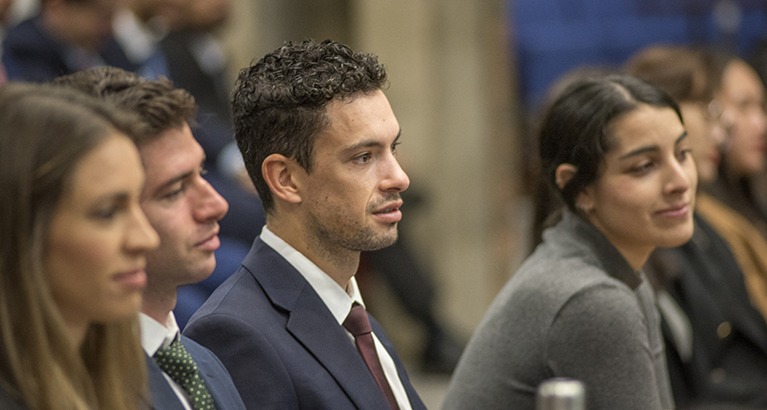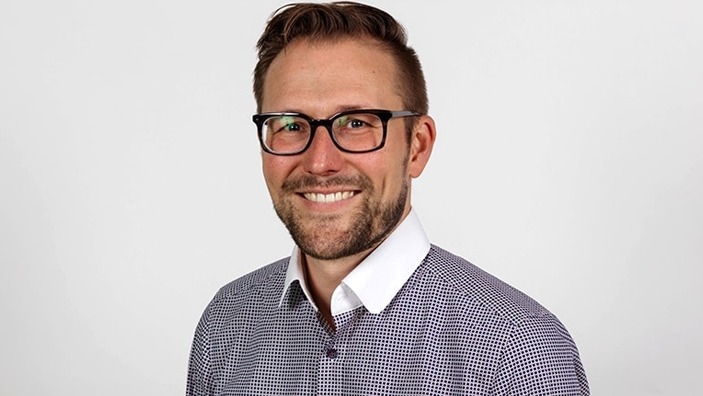
Matthew Grimes, Professor of Entrepreneurship and Sustainable Futures, relishes teaching the MBA Sustainable Business Concentration. “It attracts an impassioned group of students. They have a high degree of interest in sustainability, not just because it opens career opportunities but because they view the associated skills as a valuable professional necessity for the future. Many of them have worked previously in the sector and are driven to improve how society and the environment interact.”
“ESG concerns are hitting businesses at every level, whether they are seeking new capital, new talent or new customer segments. Through our new MBA sustainability pathway and concentrations, focused on business, energy, the environment, together with social issues, we are addressing the grand issues of our time. But few of them are new themes. The 17 UN Sustainable Development Goals (SDGs) adopted by the United Nations in 2015 encompasses challenges which have persisted throughout history despite our best efforts to resolve them.”
Through our new MBA sustainability pathway and concentrations, focused on business, energy, the environment, together with social issues, we are addressing the grand issues of our time.
COP28 and progress from The Paris Agreement
As the world moves toward COP28 and attempts to reflect on the progress related to The Paris Agreement of 2015, Grimes worries that there is a tendency to collapse sustainability considerations to concerns of climate change and CO2 reduction without accounting for the many interdependencies between those concerns and other important issues.
“We teach our students that there is so much more to sustainability. New technologies like AI and genomic engineering offer massive opportunities, but both also introduce critical climate and even existential risks. Sustainability is not just about how we mobilise our response to the immediate challenge of climate change, but also embed ESG considerations into the core of future business strategy.”
He sees companies increasingly looking to hire individuals with sustainability experience at both junior and mid-entry levels. “Many people choose to do an MBA after becoming disillusioned with their current job. The programme here is very intense and opens students up to possible career paths wherein they can align their professional careers with their values.”
Sustainability is not just about how we mobilise our response to the immediate challenge of climate change, but also embed ESG considerations into the core of future business strategy.
Alumni careers in sustainability
The startup entrepreneur and founder: Alban Bressand
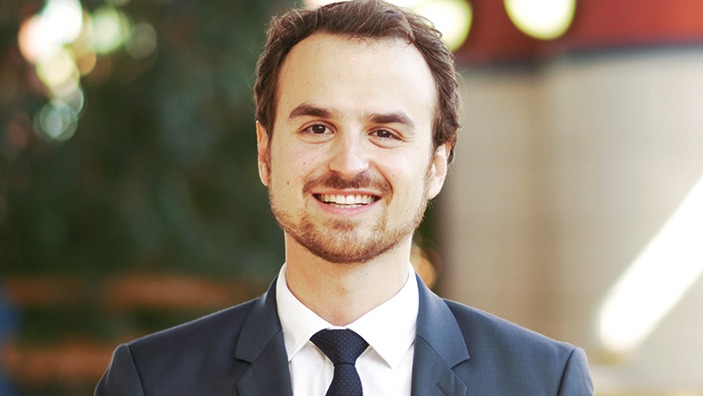
Alban Bressand (MBA 2018) spent his career working in sustainability before coming to Cambridge. His hope was to join or create a startup but first he needed the business skills.
“Many people choose Cambridge for their MBA because of its international nature. I came specifically to learn how to be an entrepreneur. I was thrilled by the teaching and have stayed in touch with my professors – Simon Stockley, who leads the MBA Entrepreneurship Concentration, and Dr Chris Coleridge, who engages on the practical side of entrepreneurship and teaches the MBA core course on Entrepreneurship.”
Alban is now Chief Revenue Officer at Reforestum, a platform to enable corporate ownership of reforestation and conservation projects, which he co-founded in 2020 with software engineer Diego Sanz, an MBA from IESE, Spain.
“I had already created a sustainability consultancy, Green Jump, but I lacked the team element. The MBA gave me the entrepreneurial skills and tools I was looking for and meeting Diego, who had a reforestation project in Spain underway, gave me the courage to follow through on a startup.”
Successful in its first angel funding round, Reforestum is looking for new backing for its ambitious plans. “We already have helped 100 corporate clients to remove or avoid 75k tonnes of CO2 from the atmosphere to date. And that is in just over 3 years.”
Despite tough funding challenges, Alban feels through Reforestum he has achieved the speed and impact he was looking for when he first started working in sustainability.
“In 2011, as part of Columbia University Earth Institute’s Millenium Cities Initiative, I spent six months working in the mayor’s office in Louga, Senegal, supporting officials on a development plan to attract private sector funding. It was a great experience but made me realise I didn’t want to work for an NGO, because it took so long to get anything done!”
Alban spent 5 years in London and Paris at Renewable Energy Systems (RES), the world’s largest independent renewable energy company, at a time when the costs of solar energy were coming down much faster than anyone expected.
“By 2016, the targets meant for 2020 had already been met. Yet despite the speed of take up of renewable energy, global emissions were still rising. After years in renewable energy and the feeling that the ball was rolling on that front thanks to declining costs, I decided to concentrate on how to recover CO2 from the atmosphere at scale and speed. My MBA was a part of that journey.”
I had already created a sustainability consultancy, Green Jump, but I lacked the team element. The MBA gave me the entrepreneurial skills and tools I was looking for and meeting Diego, who had a reforestation project in Spain underway, gave me the courage to follow through on a startup.
Financing investments for climate change: Baysa Naran
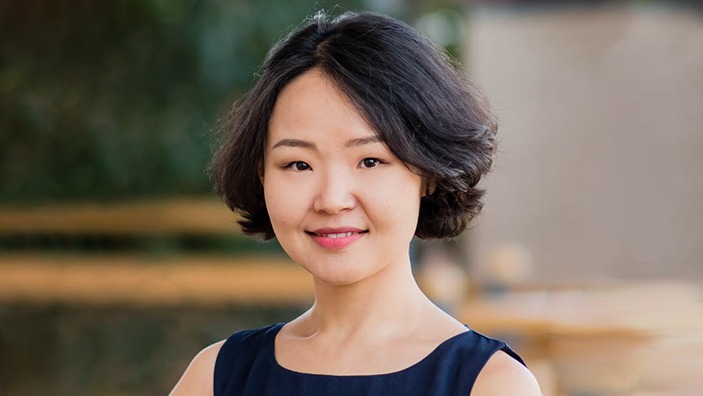
Baysa Naran (MBA 2018) is a Manager at analysis and advisory organisation Climate Policy Initiative (CPI), in London, where she leads CPI’s Climate Finance Tracking workstream including the Global Landscape of Climate Finance.
“Now is the only time to solve climate change and we must all be in it together. I expect some of the most difficult discussions at the forthcoming COP28 will be around climate financing.
My learning during the MBA deepened my understanding of the complexities around energy and the environment. I appreciated the way in which the information on the energy sector in my MBA electives was delivered in an analytical and neutral manner.”
Baysa studied Finance and Accounting as an undergraduate at Marmara University in Turkey. “As a student I wondered how we could have perpetual economic growth without consequences. I wondered if economic growth and sustainability can go together, but I saw it more as an interest than a career path. People hiring into jobs in the sustainability sector then were looking for environmental scientists. Now the sector is evolving requiring talents with multidisciplinary backgrounds, therefore, there are more opportunities to be an agent of change.”
Baysa spent eight years at PwC, as a fiscal policy consultant, some of it working in Ulaanbaatar, Mongolia, where she provided technical advice on large-scale investment projects for multinational private companies.
“My job covered fiscal policy projects at the public private juncture, and I was keen to study the opportunities available working specifically in sustainability and climate change. A yearlong MBA programme was the perfect opportunity to dedicate some time out to think about my future.”
“To go job hunting again though was scary. It was a long time since my interviews for PwC and I was out of practice. The career support I received during my MBA at Cambridge was very helpful and I felt in a very safe environment.”
My job covered fiscal policy projects at the public private juncture, and I was keen to study the opportunities available working specifically in sustainability and climate change. A year-long MBA programme was the perfect opportunity to dedicate some time out to think about my future.
Developing core business strategy for change: Brian Parham
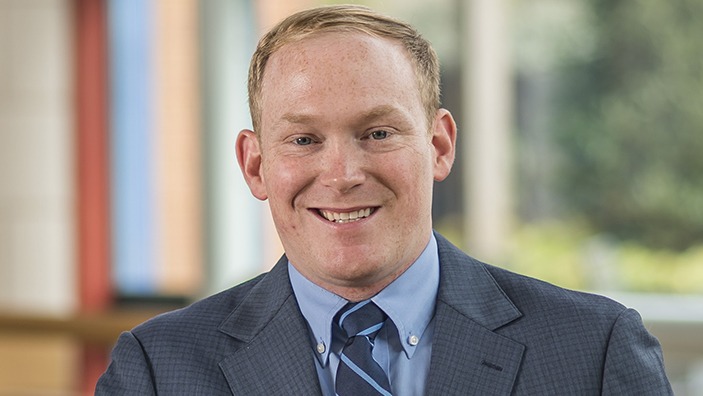
Brian Parham (MBA 2019) is Manager for Programs and Partnerships at The Lightsmith Group, a New York City based, global investment fund focused on climate adaptation and resilience technologies. His motivation for studying for his MBA was to facilitate the move from the public to the private sector while still working in the field of sustainability.
After graduating with a degree in biological sciences from North Carolina State University, Brian spent 6 years working in Washington DC at the International Conservation Caucus Foundation (ICCF).
“I became Chief of Staff, liaising with policy makers and government leaders on environmental issues. By the time I left to do my MBA in the UK, ICCF was operating across fifteen countries. I was then looking for the opportunity to drive bigger sustainability projects in the private sector, where I could really see the impact.”
Brian chose to study for his MBA in Cambridge after being encouraged to visit Cambridge Judge Business School by his former boss at ICCF. “An alumnus himself, he encouraged me to consider Cambridge Judge. It ended up being a great fit for me as I was attracted by the opportunity to engage with a group of people from a wide variety of professional backgrounds and by the international culture at the Business School. When asked about my Cambridge MBA year, I consider studying and working with my peer cohort as the best part of the experience.”
Brian has been able to deploy much of his experience from his MBA year in his current job.
“Experiences while at Cambridge, including my Cambridge Venture Project (CVP), working with the National Institute of Agriculture and Botany and as Engagement Manager for the Cambridge Consulting Network, working with a local sustainability startup, provided me with skills and experiences with accelerators that were then very useful as the Program Manager for the Adaptation SME Accelerator Program (ASAP).”
“Companies are increasingly realising that building climate resilience and sustainability into core business strategies can drive innovation and increase revenue. At COP28, I expect to see a strong emphasis on public-private sector partnerships to increase investment in this space and address the climate adaptation finance gap. Action is needed now, and both the public and private sector need motivated and skilled professionals to contribute towards lasting impact.”
Companies are increasingly realising that building climate resilience and sustainability into core business strategies can drive innovation and increase revenue.


